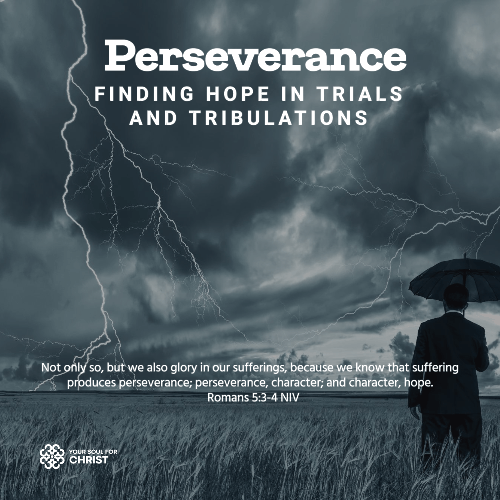Not only so, but we also glory in our sufferings, because we know that suffering produces perseverance; perseverance, character; and character, hope.
Romans 5:3-4 NIV
What trials are you currently facing? Can you view them as opportunities for spiritual growth and development instead of as burdens? As believers, we must see our situations as opportunities for God to glorify His name. The Bible teaches that suffering leads to perseverance, perseverance shapes character, and character fosters hope. This helps us understand how challenges can deepen our faith and strengthen our spirits.
The Bible does not promise a Christian life free of trials and tribulations. In John 16:33, Jesus says, “I have told you these things so that in me you may have peace. In this world, you will have trouble. But take heart! I have overcome the world.” We must always believe this since the Lord has overcome the world for us. The question today is: do you glory in your tribulations, or do you consider tribulation a sign of God’s unfaithfulness?
Consider Job’s life as an exemplary story of how suffering produces perseverance. Job was a righteous man who faced immense suffering, losing his wealth, health, and family. Despite his deep anguish and confusion, Job persevered in his faith. He questioned God but never abandoned his faith in God’s sovereignty. Job’s perseverance through suffering eventually led to a deeper understanding of God and restored blessings.
Suffering, though painful, is often the catalyst for perseverance, which is the ability to endure difficult circumstances with steadfastness. It involves not just passive endurance but active, resolute continuation in faith despite hardships. As believers, we must ask ourselves if we have faced what Job went through. Most likely, none of us have faced even half of it, so we have no excuse not to glory in our tribulations. To glory in suffering is to have joyful confidence in God, even when the situation has not yet changed.
The story of Joseph is another example of how perseverance leads to character. Joseph was sold into slavery by his brothers, unjustly imprisoned, and forgotten by those he helped. Despite these trials, Joseph remained faithful to God. His character was tested repeatedly, but he emerged each time with greater integrity, wisdom, and strength. By the time he became the second in command in Egypt, Joseph’s character had been refined to the point where he could forgive his brothers and recognise God’s hand in his journey (Genesis 50:20).
Romans 5:3-4 challenges believers to view suffering not as a sign of God’s absence but as a tool in His hands to build perseverance, shape character, and instil hope. Examples like Job and Joseph illustrate how this process unfolds in the lives of those who trust in God. The Bible encourages us to embrace our trials, knowing that God is at work, refining us and preparing us for a hope that does not disappoint.
In conclusion, our trials are not evidence of God’s absence but of His active involvement in our spiritual growth. By viewing suffering as an opportunity for development, we can build perseverance, shape our character, and strengthen our hope. Embracing our challenges with faith, as Job and Joseph did, will lead us to a deeper understanding of God’s purpose and promise in our lives. Let us trust in God’s refining process and remain steadfast in our faith, knowing that the hope He gives us will not disappoint.
